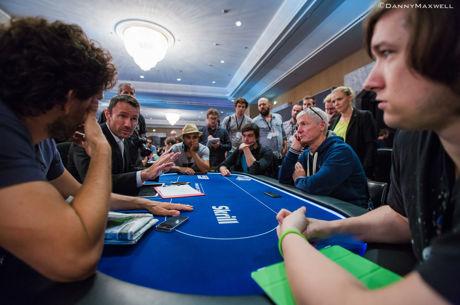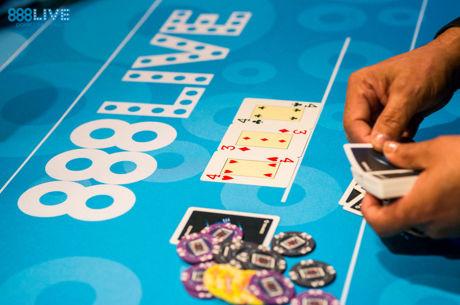Casino Poker for Beginners: The One Thing You Can't Discuss at the Table

Ed. note: For those who might have missed it before, we're reprising Robert Woolley's series of articles for poker players who are new to live poker. The series is great for newcomers, and likely useful as well to those with experience playing in casinos and poker rooms.
Live poker is intrinsically a social game. It's "a people game played with cards," as the saying goes. As such, conversation is part of the game. Poker would be a boring, miserable experience if it had to be played in silence.
Sometimes the talk is about poker, but even more often it will be about other casino games, sports, current events, politics, sex, family, movies — you name it. Heck, I once played with 2004 WSOP Main Event champion Greg Raymer, and he engaged the table in a lively discussion about what it would be like to be a lobster, and whether it would be worth giving up having a cerebral cortex in order to gain the ability to regrow severed limbs.
Within the ordinary social bounds of decency, nothing is off-limits as a topic of friendly chat at the poker table — with one exception: you may not talk about the hand in progress. That exception is so important that I'm devoting an entire article to it, and even that, I'm afraid, will be an inadequate explanation.
The Challenge to Keep Quiet About the Hand
Let's start with the reason behind the rule. It's an offshoot of the fundamental precept of "one player to a hand." That is, every player must make his own decisions as to the play of his hand without outside input.
It's sort of like the "prime directive" in Star Trek — you are prohibited from interfering with how the hand is going to play out. Just about anything you say about the hand in progress might help or hurt another player, often in ways that you can't anticipate. Hence the mandate: don't talk about the hand in progress.
That seems straightforward enough, doesn't it? Then how can such a simple dictate be worth more than a thousand words of further explanation? Well, there are some problems with implementing the rule.
The first problem is that situations commonly arise in which you must talk about the hand in progress. For example, perhaps you thought you heard somebody say "all in," but didn't catch who said it. Maybe you're not sure whether the ambiguous hand gesture of the player on your right was him checking or just tapping his hand idly while he thinks. It is your responsibility to know what the action is before you take your turn, so now you'll have to ask the dealer to clarify what has happened.
Or perhaps you see something improper happen — say a player prematurely exposes his cards, somebody acts out of turn, or a raise is an illegal amount. If the dealer doesn't catch the problem and get it fixed, you have to speak up and call his attention to it, because the hand can't continue without getting it fixed.
The second thing muddying what seems like a bright-line prohibition is that there is another whole category of things that are about the hand in progress, but which are perfectly okay to be talking about.
Any facts that are supposed to be freely available to all players are fair game to be spoken aloud. For example, a player who forgot to bring his glasses may ask whether a card on the board is the queen of hearts or diamonds. If you didn't hear how much somebody declared his bet to be, you can ask. You can ask how many chips a player's all-in bet is. You can even ask about poker rules that you need to know — for example, how much the minimal legal raise would be in the current situation.
The dealer is primarily responsible for being sure that all players are up to speed on all such freely available information, but if he is preoccupied or inattentive, it's fine for other players to speak up as needed.
The third problem with the prohibition on discussing the hand in progress is that there are all sorts of borderline and debatable cases, where reasonable minds may differ on whether the words spoken constitute a violation of the rule or fall within one of the exceptions. It's beyond the scope of this article to hash out such nuances, but you should be aware that they exist. The best advice is just to steer well clear of any questionable cases. Choose silence over blurting out when you have any doubt at all.
The fourth, and perhaps biggest, problem with the rule is that the hand in progress is such an obvious, juicy, interesting, important subject for discussion that poker players simply cannot resist it. It's like Adam and Eve having a whole garden full of food to eat, but what most lures them is the one forbidden tree.
Enforcement is also a problem, because many players come to a casino from home games where this rule is "more honour'd in the breach than the observance," as Hamlet put it. Furthermore, many dealers are weary of constantly reminding players not to talk about the one thing they most want to talk about, so policing is erratic. This causes a snowball effect, because players not corrected get the impression that their small talk is acceptable, when it is not.
What Not to Say
Let's consider some concrete examples:
- The flop comes AxAx4x. You smack the table and exclaim, "I folded my ace, dammit!" This is an unambiguous violation. It gives potentially valuable information to other players. The guy who is playing Ax2x now doesn't have to worry that somebody else has the fourth ace with a bigger kicker, and the guy who was planning a bluff now knows that it will be much harder to convince others that he flopped trips. You have thus changed how the hand would have been played.
- The river brings a fourth spade. The first two players both check, with two more yet to act. You say, "Come on, one of you has to have made that flush!" Again, this is a clear violation. It may seem like you're not revealing anything that isn't already known to all, but that's not necessarily so. A player may be too drunk or too intently focused on a football game to have noticed that he has a flush. Somebody else may have been blissfully thinking he had the nuts with the highest possible straight, and failed to notice the cards' suits — and you just tipped him off that he might be in trouble. You never know what other players are thinking, or not thinking.
- If somebody puts in a large preflop reraise and you say, "He must have a big pair," you are breaking the rule.
- If somebody overbets the pot and you say, "There's a guy who doesn't want a call," you are breaking the rule.
- If somebody bets and you observe out loud, "He's pot-committed now," you are breaking the rule.
- If there are four nines on the board and you say, "Any ace wins it," you are breaking the rule.
In each example, the remarks have the potential to help another player figure out something he didn't grasp on his own, and thus change what he decides to do. They are thus forbidden.
Again, you are, sadly, likely to hear such comments frequently when you play in a casino poker room, and the dealer may or may not be diligent enough to correct the guilty parties. But don't take that as encouragement to join in. As your mother probably taught you, just because other people are doing it doesn't make it okay for you to do it, too.
Be the good example, and keep yourself out of trouble. Except for the narrow circumstances I mentioned earlier, make the hand in progress the one thing you never talk about at the poker table.
But feel free to debate what life is like for lobsters.
Robert Woolley lives in Asheville, NC. He spent several years in Las Vegas and chronicled his life in poker on the "" blog.
In this Series
- 1 Casino Poker for Beginners: Taking a Seat in Your First Game
- 2 Casino Poker for Beginners: How to Keep or Change Seats in a Cash Game
- 3 Casino Poker for Beginners: Playing Your First Round
- 4 Casino Poker for Beginners: Rules and Etiquette Regarding Poker Chips
- 5 Casino Poker for Beginners: How to Handle Chips When Betting & Raising
- 6 Casino Poker for Beginners: Chip Rules, Chip Tricks, Collecting & More
- 7 Casino Poker for Beginners: The Deal With the Dealer Button
- 8 Casino Poker for Beginners: Missed Blinds, Seat Change & Other Buttons
- 9 Casino Poker for Beginners: Kill & Half-Kill Buttons, Overs and More
- 10 Casino Poker for Beginners: Lammers, Rebuy Buttons, Add-Ons and More
- 11 Casino Poker for Beginners: Keep Your Hole Cards Hidden
- 12 Casino Poker for Beginners: Marked Cards, Automatic Shufflers & More
- 13 Casino Poker for Beginners: Exposed Cards, Fouled Decks & Other Oddities
- 14 Casino Poker for Beginners: What It Means to 'Protect Your Hand'
- 15 Casino Poker for Beginners: When to Keep Your Cards Covered
- 16 Casino Poker for Beginners: Etiquette When Sharing Space at the Table
- 17 Casino Poker for Beginners: Bonuses, Jackpots, Drawings & Other Promos
- 18 Casino Poker for Beginners: Talking 'Table Stakes'
- 19 Casino Poker for Beginners: The One Thing You Can't Discuss at the Table
- 20 Casino Poker for Beginners: Be Careful Whenever Using 'Action' Words
- 21 Casino Poker for Beginners: Make a Mistake? Three Ways to Respond
- 22 Casino Poker for Beginners: Get to Know Poker Room Personnel, Part 1
- 23 Casino Poker for Beginners: Get to Know Poker Room Personnel, Part 2
- 24 Casino Poker for Beginners: A Few Unusual House Rules
- 25 Casino Poker for Beginners: Chopping Blinds - Etiquette & Expectations
- 26 Casino Poker for Beginners: Don't Do This When Playing With a Friend









